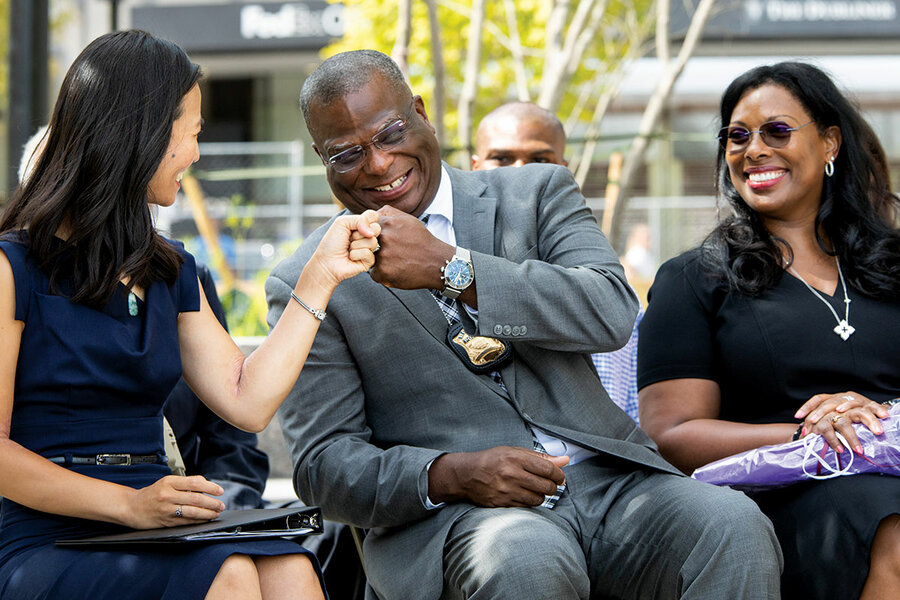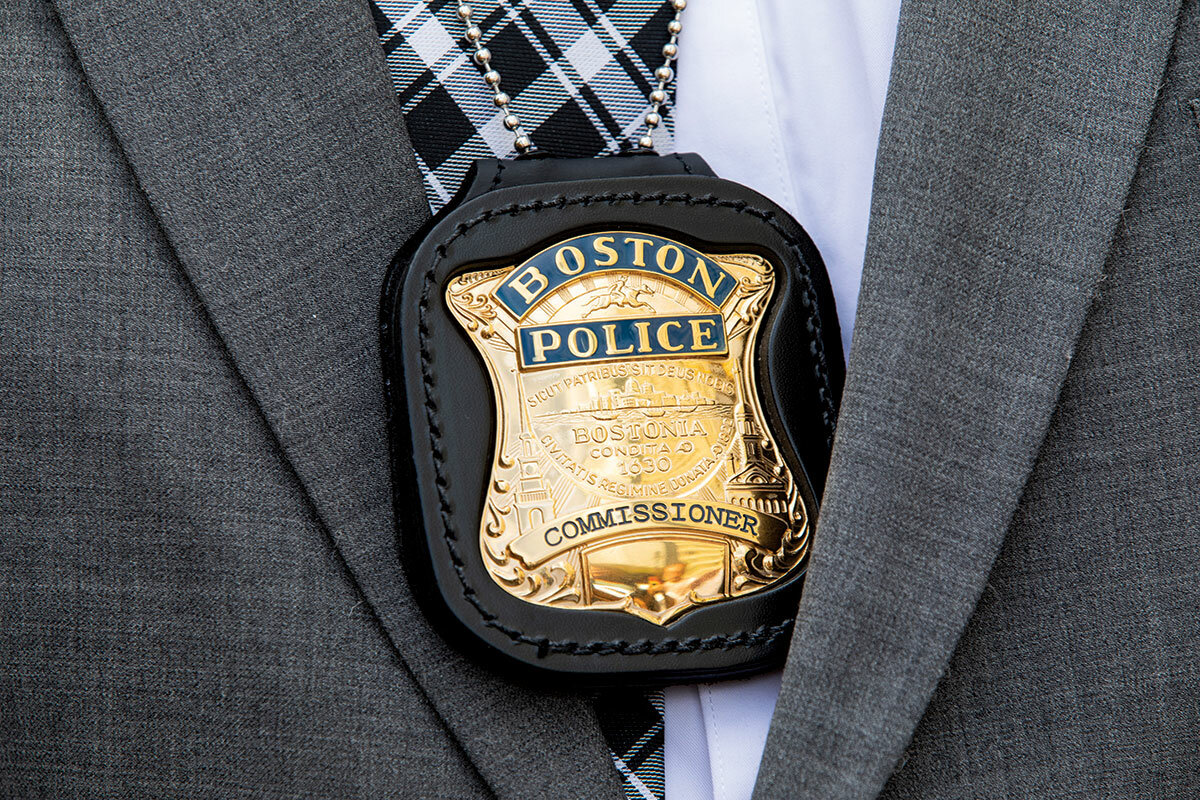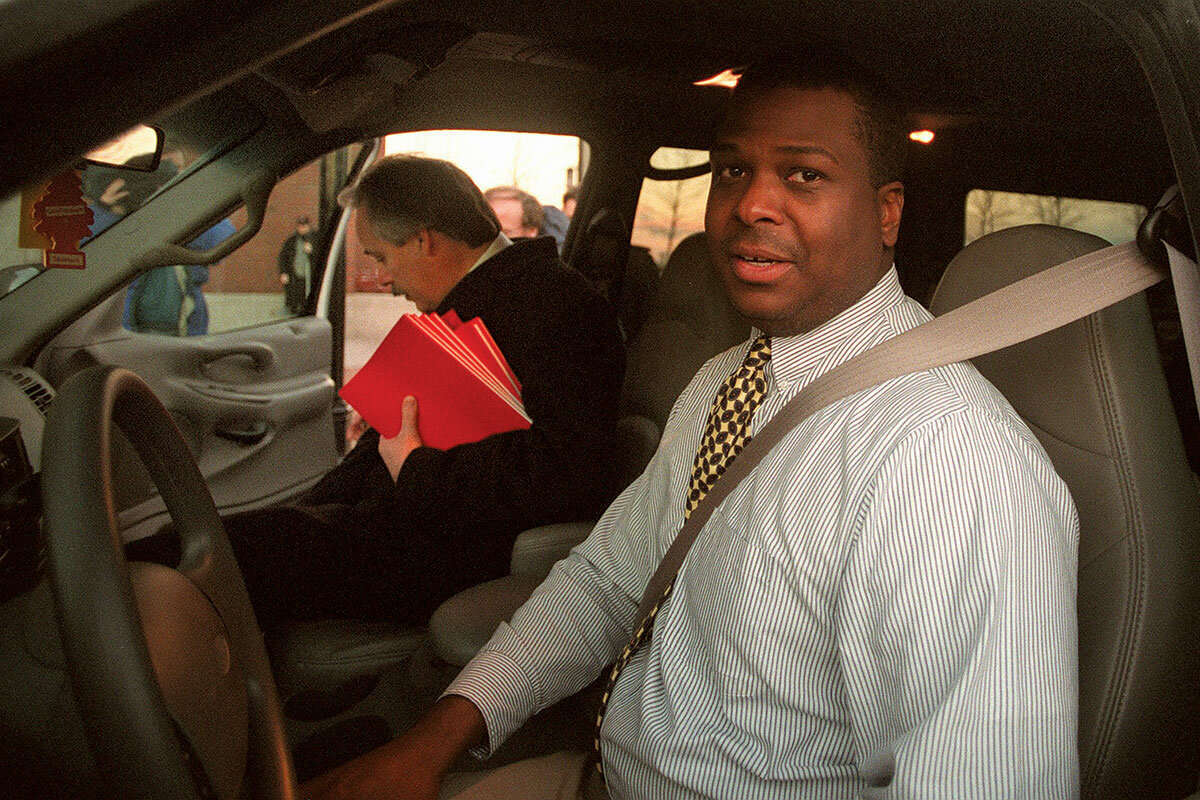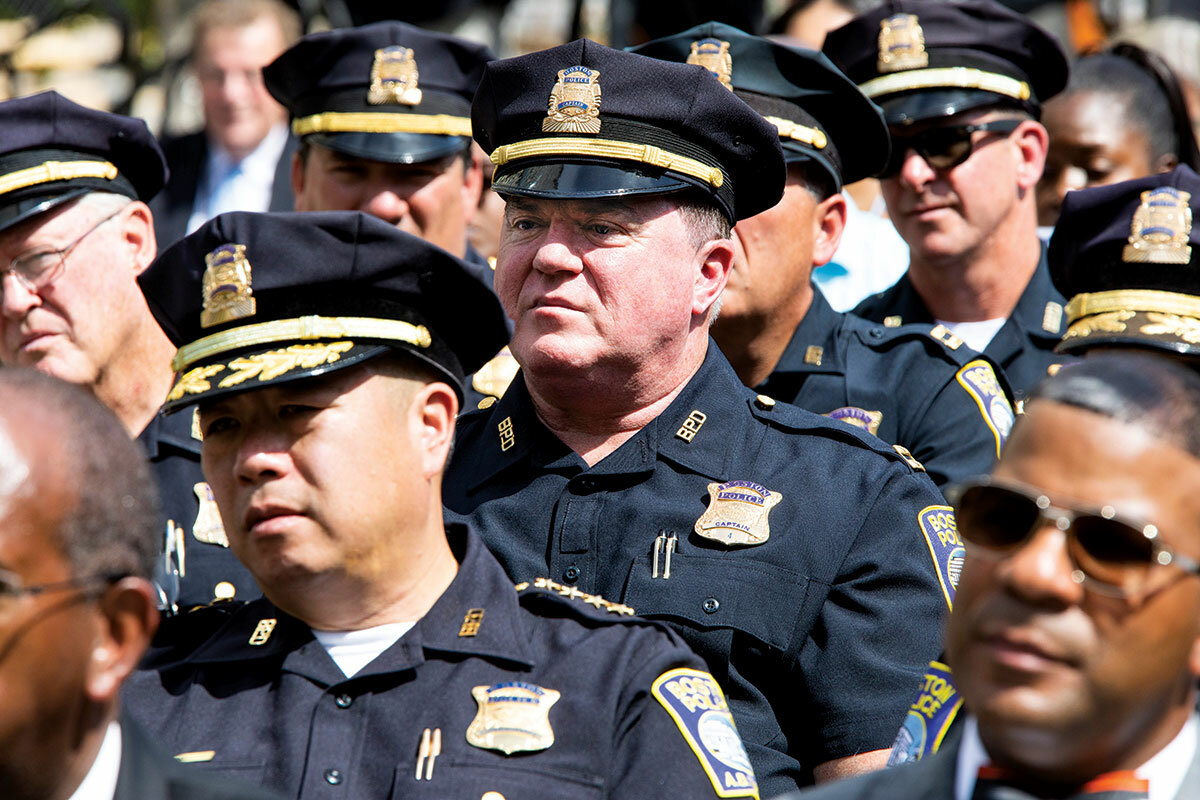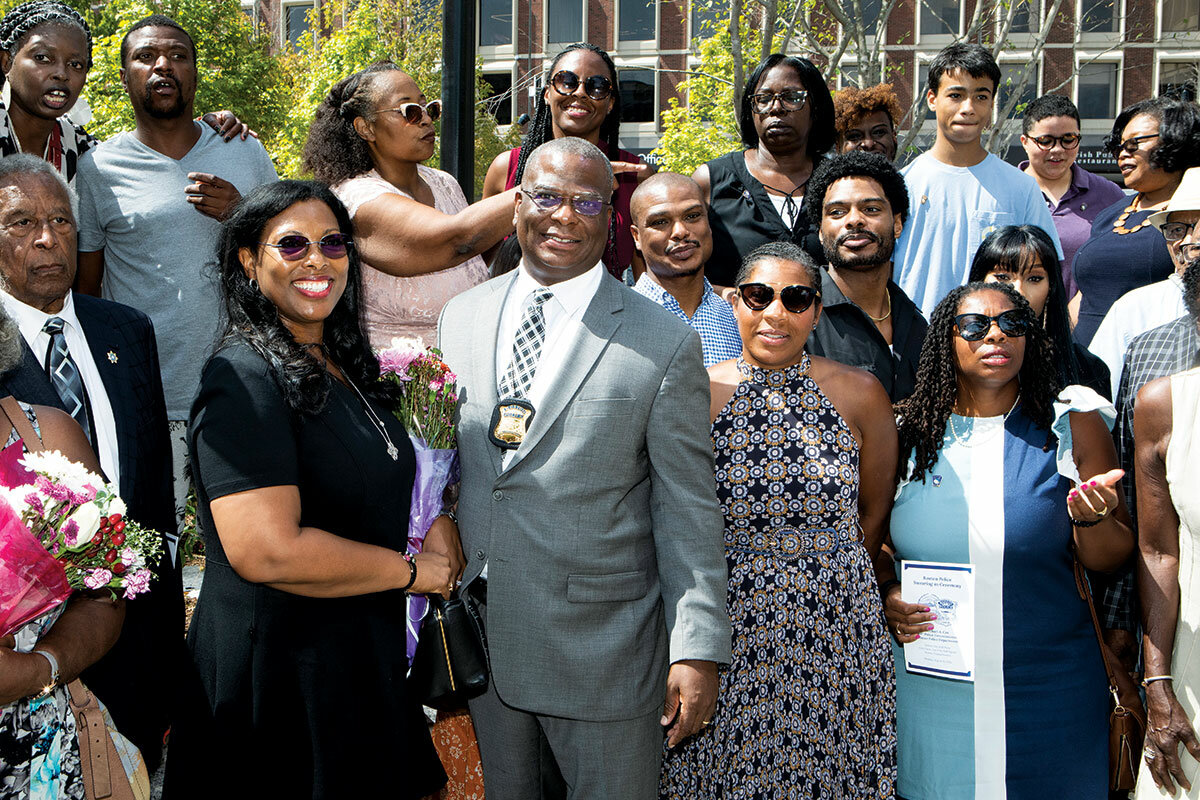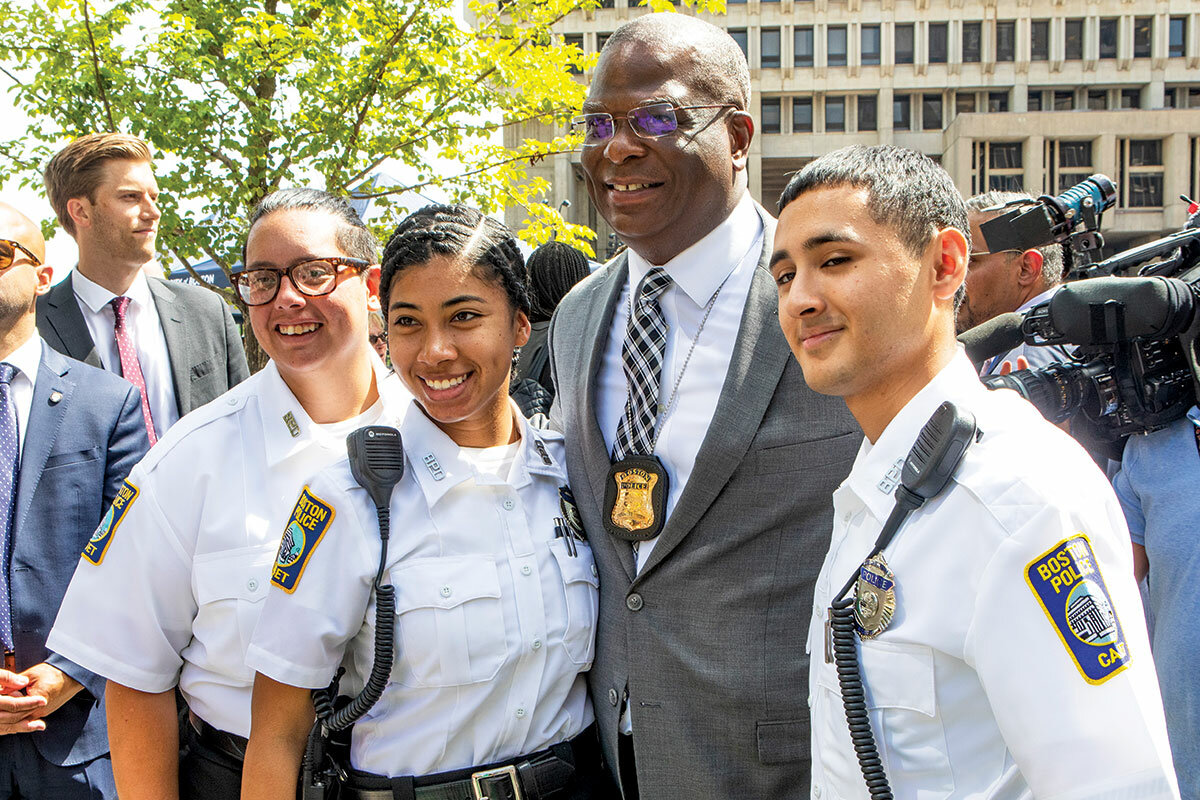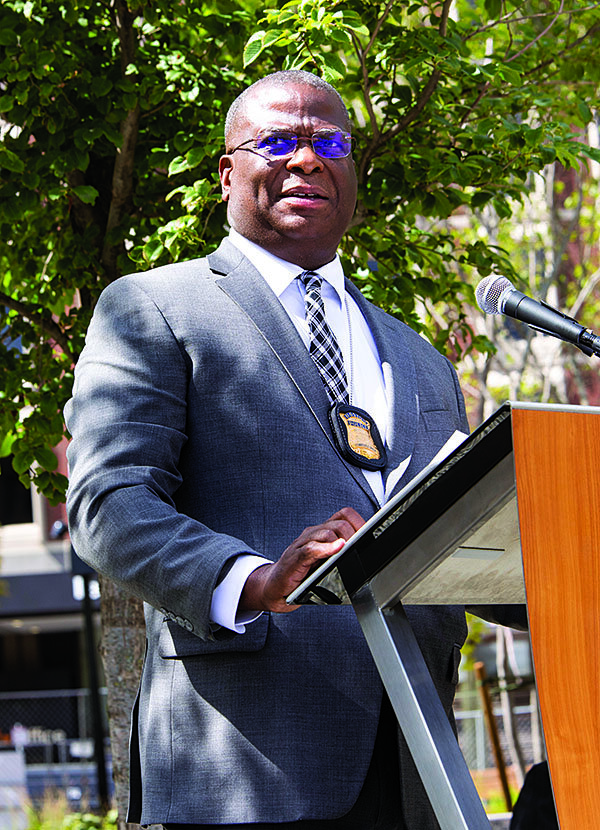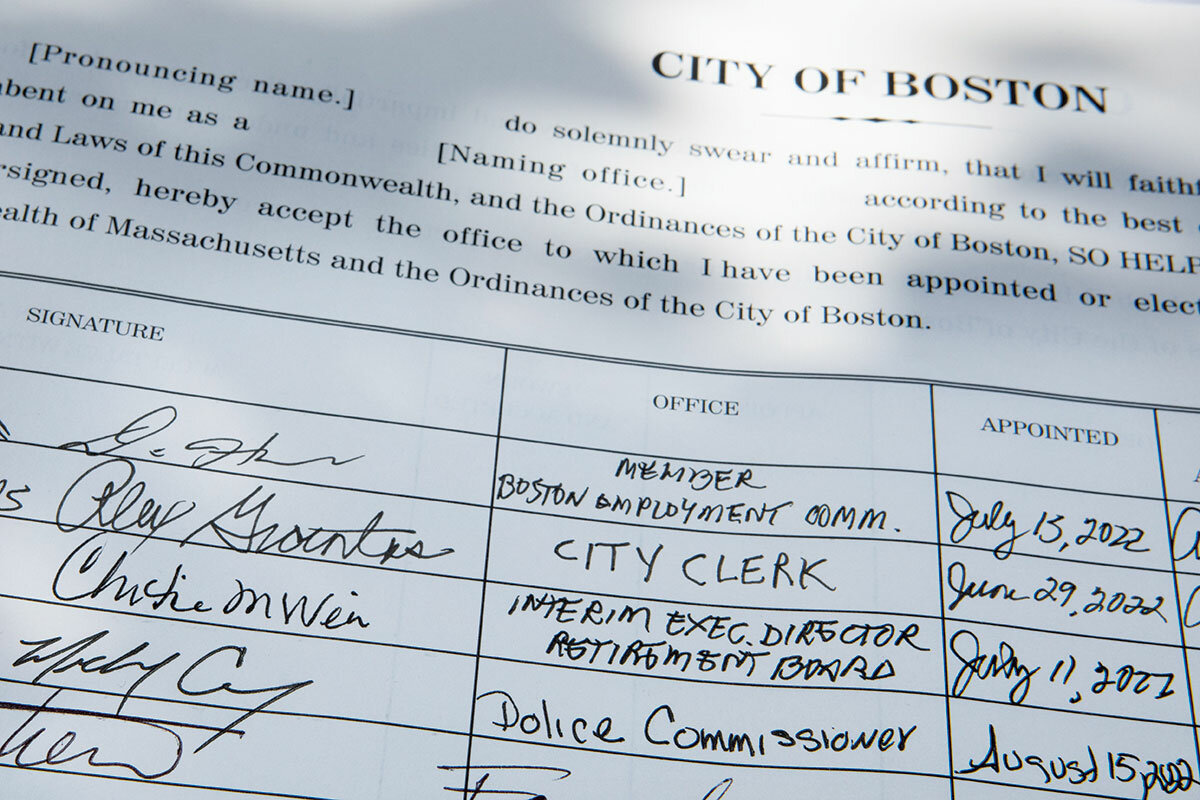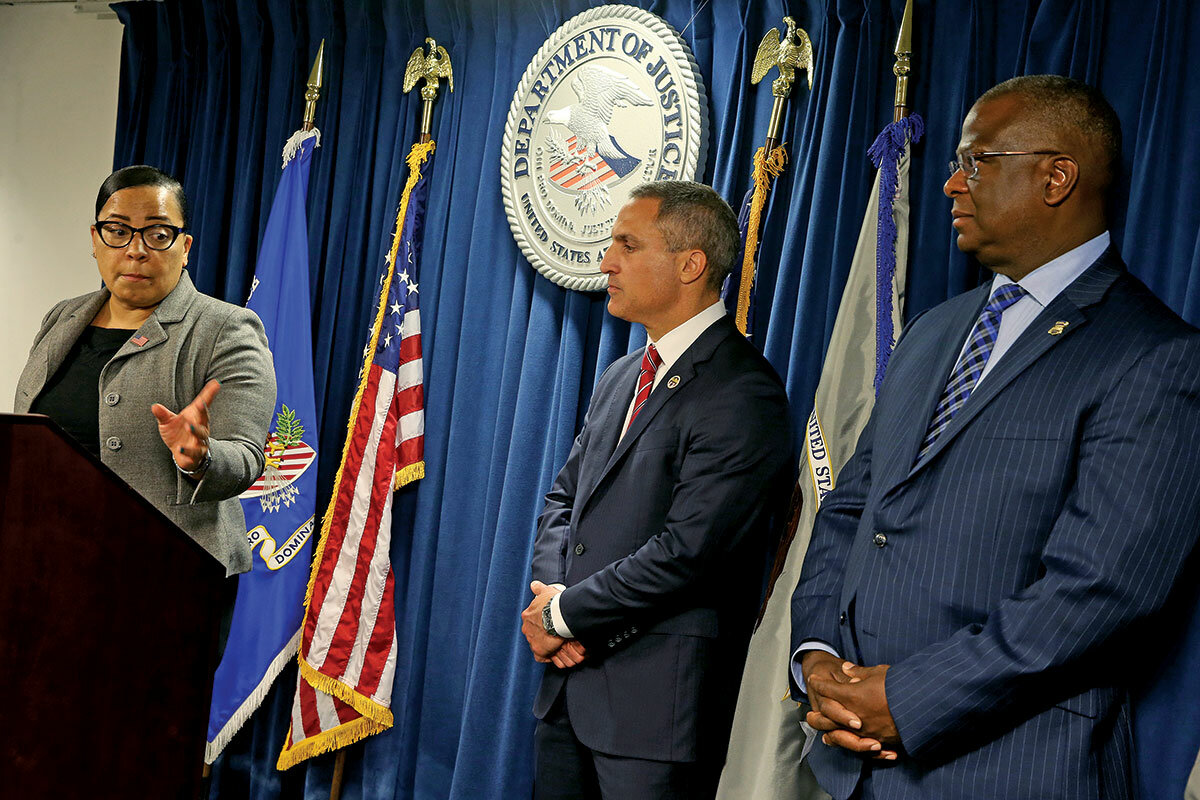Michael Cox was beaten by Boston police. Now he leads them.
Loading...
| Boston
Even as Bertha Cox’s memory was dimming and she didn’t recognize her son when he visited her in the nursing home, Michael Cox’s mother did recognize his blue Boston police officer’s uniform and what it meant. She told fellow residents she believed that the man wearing it would always protect her.
For her, a police officer was a trusted figure – in spite of it all.
While on duty as a plainclothes officer with the Boston Police Department (BPD) in 1995, Mr. Cox – who is Black – was mistaken for a gang member by a group of fellow officers chasing a suspect. He was thrown to the ground and brutally beaten. And when the officers realized their mistake, they left him lying seriously injured in the icy January night.
Why We Wrote This
A story focused onHow the survivor of a racist police beating rose quietly to lead Boston law enforcement is a story of trust in the system and perseverance.
The episode spooled out into a reckoning of the city’s racist tensions and history of forced desegregation – at the heart of which is the police department charged with serving and protecting neighborhoods from the tony lanes of Beacon Hill to some of the dangerous streets of Roxbury and Dorchester.
Mr. Cox – with his mother and large extended family supporting him – fought the institution’s “blue wall of silence,” that unwritten cop-protecting-cop code, to win a $1.3 million settlement. And, despite his fight against the department, he was able to salvage his career and rise in rank, managing various divisions before moving on in 2019 to lead the Ann Arbor, Michigan, Police Department.
His professional trajectory was a quiet epic of resilience and trust for the son of a Black family who fled the racist violence and poverty of the Jim Crow South in the Great Migration, staking claim to a middle-class life in the relative safety of Boston. Mr. Cox was born in 1965 at the height of the civil rights movement and was raised in a family that respected and trusted the law enforcement community.
That trust took an almost unbelievable turn in Mr. Cox’s selection last August to lead the very police department he fought for justice. It says as much about the character of the man as the character of this pivotal national era of violent policing – as seen last month in the Memphis, Tennessee, beating death of Tyre Nichols – and the pressure to reform law enforcement.
Boston police Commissioner Cox insists that the ugly history he has with the department does not define him.
But the truth is that people can’t help but watch him through that lens.
Mayor Michelle Wu called her appointment of Mr. Cox a “homecoming.” One prominent Black pastor called it “poetic justice.” Others, like Tom Nolan, a former Boston police officer who writes on criminal justice issues, call it remarkable that Mr. Cox “stayed the course” and came back.
Mr. Cox knows the “darker side” of policing intimately – but it will also be a “test,” says David Harris, former managing director of the Charles Hamilton Houston Institute for Race & Justice at Harvard Law School. That’s because ahead of the new commissioner lie challenging leadership tasks that, civil rights experts say, are often conflicting: building bridges with communities of color, preventing young people from entering the world of crime, and boosting morale among police officers.
“While there is hope he can do it,” says Mr. Harris, “what we need to hear are the actions designed to address the policing practices that have been oppressive – that is the measure people are going to use.”
A quiet power
Six months into his BPD leadership, Mr. Cox has offered few of those actions – instead striking a quiet, listening profile. That’s in contrast to his boss, Mayor Wu, who bounded into office last year promising to bring order to a police department that hadn’t had a permanent leader for over a year. Her bold checklist of police reform priorities – such as diversity hiring, fixing racially discriminatory practices, and eliminating excessive overtime in favor of new hiring – immediately put the department on edge.
“We’re not going back to the days where the police just come in and just start doing what they think is best without input from the public,” Mr. Cox told The Boston Globe in December. “We need to actually hear from the people who live here, so we can formulate a plan that’s going to address all those concerns.”
Though his protective family worked hard to keep Mr. Cox, the youngest of seven children, off the streets of their tough Roxbury neighborhood – sending him to private local schools and later a boarding school in Connecticut – his connection to that world is at the heart of his community policing philosophy.
Of half a dozen colleagues interviewed by the Monitor, none could point to how they think his “community policing” philosophy will translate into policy for the troubled police department. But all point to what they see as his real power: “gravitas,” “kindness,” “decency,” and “sincerity.”
When Kathleen O’Toole, a former BPD commissioner, promoted Mr. Cox to the post of deputy superintendent in 2013, she fully “expected to meet someone who harbored resentment,” she says. But she was struck by his “genuine” explanation that he did not.
“Out of the hundreds of new police officers I’ve managed, only a handful will remain with you,” says Mr. Nolan, who supervised Mr. Cox in the late 1980s. “And Cox was one of those. He was assertive without being aggressive.”
But being “soft-spoken” and “tenderhearted,” points out Mr. Nolan, are the sort of qualities often dismissed and berated in a “policing subculture of aggression and domination.”
However, he adds, they’re also the qualities that can help police officers build meaningful relationships with the community.
At least one critic takes issue with that soft-spoken temperament.
“He’s the smartest commissioner we’ve had ... and he gives me confidence,” says Jamarhl Crawford, an activist who served on the mayor’s 2020 Boston Police Reform Task Force. But he says Mr. Cox didn’t speak up on police brutality when he was in charge of BPD internal affairs. “If I was an officer who got beat up, I would have raised holy hell.”
Roots in the community
The strong Cox family network is a window on the authenticity of Mr. Cox’s sensitivity.
His parents, Bertha and David Cox, fled Tennessee for a more hopeful future. But, as Mr. Cox said on the day of his swearing-
in last August, they endured racism in the largely white Roxbury of the 1950s while his father, a landscaper with just an eighth grade education, started one of the first Black-owned businesses in Boston.
“Those were my role models,” he said of the lessons in resilience he got from his mother’s firm spiritual grounding and his father’s integrity. “They supported us and relied on each other.”
Following the riots during the civil rights movement of the 1960s, white families moved out. The neighborhood and its commercial centers changed rapidly and had a dangerous reputation. If a Black person was involved in a crime anywhere, explains Mr. Cox’s sister Cora Davis, it was automatically assumed they had to be from Roxbury.
While the Coxes worked hard, they expected their children to do their best at school and devote all their energies to learning. Mr. Cox got scholarships to mostly white, private schools during Boston’s years of court-mandated busing to desegregate schools. He then graduated from a prestigious boarding school in Danbury, Connecticut. His family was always around to help and support as Mr. Cox navigated the challenges of private schooling.
The baby of the family, Mr. Cox is described in angelic terms by his sister Barbara Cox Wooten. She recounts the family’s go-to legend of Michael as a boy of 8 when he found a bird injured in a fall from a tree. He nursed it with cracker crumbs and droplets of water. When it died, he was distraught and prayed over the bird, built a casket, and buried it in a backyard funeral service.
The grit of the family’s patriarch, David Cox, is a powerful family theme, says Vanessa Sumpter, Mr. Cox’s niece: “He was about integrity. Character [he would say] would get you further than education. Your character would open doors for you.”
It may have contributed to idealistic miscalculation, writes journalist Dick Lehr in an exhaustive 2009 book about Mr. Cox’s life and infamous assault, “The Fence: A Police Cover-up Along Boston’s Racial Divide.” “He was the young man from a middle-class black family who believed character and hard work meant more than race. In many ways he was color-blind,” wrote Mr. Lehr.
Mr. Cox told Mr. Lehr: “When I first came on the job, I never really considered myself just a black police officer. I just considered myself a police officer. It was the way I was brought up.”
Mr. Cox said in a recent Boston Black News radio interview that he was seen as a disloyal “troublemaker” at the BPD after the assault, which he always refers to formally as “unconstitutional policing.” It was an unfamiliar position for a man whose family expectations channeled him into good behavior throughout his youth.
Mr. Cox rebelled once. He was 16 and away at boarding school when his father died. Each time he called home, he was told that his dad was too sick to come to the phone. “We wanted to protect him,” Ms. Davis says, justifying the familial deception.
But the teenage Mr. Cox felt differently. His rage of disillusionment was deep, and he refused to go back to school in the wake of his father’s death. His mother, also grieving, would have none of it and packed him up and drove him back to the Connecticut boarding school herself.
That firm motherly hand directed the family in matters of faith, too, say the Cox siblings. She took them to church every Sunday and infused forgiveness in them all.
“Each of us holds it differently,” says Ms. Davis, “but we do try to understand what circumstances might have led someone to behave in a certain way. We are humans.” She clarifies that all Mr. Cox wanted after his assault was an apology – and he sued the city only when that did not come.
Indeed, the “troublemaking” lawsuit – which brought Mr. Cox hundreds of harassing phone calls, death threats, slashed tires, and vandalization of his home – may have been the only route he could have taken to stay in the police force and make a difference. Mr. Nolan emphasizes how tough it would have been for Mr. Cox to sue and expect to stay in the force: “[At the time of the assault] he was on the lowest rung of the order and he also had a family to support.”
To fight anything in such a hierarchical organization as the police department, with a few dozen superintendents and deputies and a few dozen more captains, would “be met by stiff resistance,” says Mr. Nolan, suggesting the lawsuit itself was activism. “Because of the blue wall of silence, criminal prosecution wasn’t going to happen. Redressal was going to happen only through civil court. Suing the city was an activist role.”
Expectations of reform
Expectations of the new commissioner are high at this moment when calls for reform in the policing system are louder than ever.
“I’ve worked to change policing since [the assault] occurred,” Mr. Cox said during his swearing-in, “and I will continue to do all I can to make sure that no Black or brown person, or any individual, no matter their gender identity or race, is a victim of any kind of unconstitutional policing.”
But observers and activists point to systemic racial biases in the police force.
Boston has a high rate of stop and frisk of young men of color. And a test that activists see for Mr. Cox is what tinkering he does with the Boston database of offenders. The American Civil Liberties Union found that 90% of the more than 4,700 names in the database in 2019 were those of Black or Latino individuals. And Mr. Harris, the scholar, says that young people can be listed for all sorts of reasons, including “bizarre” ones such as the way they dress.
Fraught relationships between the BPD and communities of color are urgently in need of repair. But in pursuing that, Mr. Cox has to strike a delicate balance, mindful of the tattered morale in the 1,600-member force. It has high attrition, personnel shortages, and a difficult time attracting women, who account for only 12% of current staff.
Senior police officials point out how it is difficult to terminate erring officers due to binding arbitration agreements.
In other words, explains a former BPD commissioner, Ed Davis, Mr. Cox needs to bring change both culturally and administratively – he’ll need to keep the public and his own people happy.
A few believe that Commissioner Cox’s recent difficult experience as police chief in Ann Arbor is instructive. Though later cleared, he was placed on brief administrative leave over allegations he created a hostile work environment and used undue influence during an investigation into officers improperly voiding parking tickets.
When she discovered that the Ann Arbor Police Department was redacting the names of police officers from complaints about them, says Lisa Jackson, chair of Ann Arbor’s oversight commission, Chief Cox was reluctant to cooperate in stopping the practice because of likely department pushback. The City Council had to force him to release the names. Likewise, Ms. Jackson’s commission had to fight the department to release its data on traffic stops.
No anger, just “inner strength”
Mr. Cox is not angry, embittered, or cynical, but a figure of dependability, say his family and colleagues.
He has a prodigious ability to juggle stressful work and act as the rock of his sprawling family. He’s been father not just to his own three children, but also to his niece who lost her father when she was young. His sister Ms. Wooten recalls that when she needed emergency help in dealing with her distraught daughter, Mr. Cox rushed to her home with his own small children in the car and had a two-hour-long conversation with his niece.
“What they talked about is unknown to me, even to this day, and Michael has remained that father figure for my children for their whole lives,” she wrote in an email.
There is deep admiration within his family for how he has been able to address his trauma and still fulfill all his obligations.
“My brother has an inner strength, which I call dignity, ... a commitment to his family, and to the police department,” says Ms. Davis.
For some of his former colleagues, he is the perfect role model for how officers ought to relate with people – listening and caring for their communities without being aggressive or dominating.
Former Boston police Commissioner Bill Evans, who conducted “peace walks” as a way of connecting with different communities, was impressed with Mr. Cox’s engagement during those walks. He had the “right perspective on community engagement” and “was a gentleman all the time.”
Mr. Cox’s humility and a dignified, calm demeanor – qualities that Mr. Nolan says can often be seen as “inimical to police practice” – are exactly what make him effective as a police officer and helped him build great contacts with the community. Musing further, he says that “if we had more people like Cox” back in the late 1980s when Mr. Cox joined the BPD, “then our police department would have been very, very different.”
For the past six months Mr. Cox has been holding meetings and listening to members of the Boston community. There is an expectation that he will bring much-needed change. Communities of color are looking to Mr. Cox’s leadership for healing; Black clergy working to prevent young people from entering the world of crime are looking for support; and justice activists are asking whether he can provide hope to a 15-year-old who is stopped by cops every day.
It may take weeks or even months before Mr. Cox unveils his vision, but for now he is working to build trust – perhaps the kind of trust that Bertha Cox held in the police.




